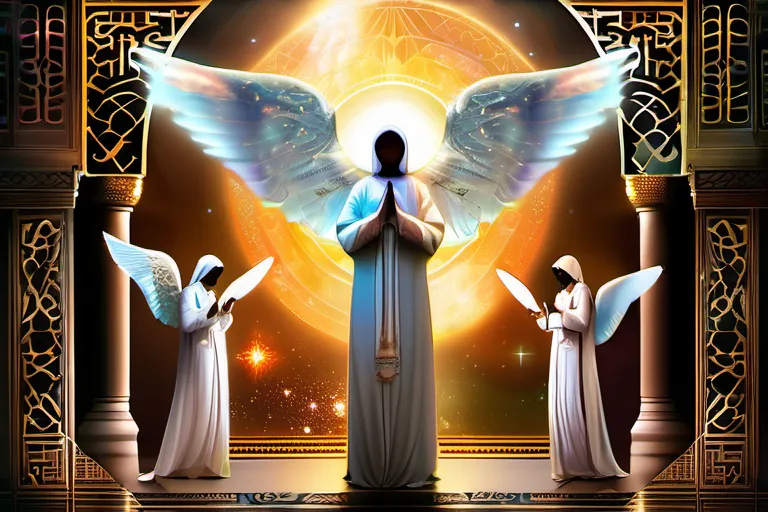Explore the significance, characteristics, and functions of angels in Islamic belief.
Delve into the fascinating world of angels as we uncover their role, attributes, and importance in the Islamic faith. From their creation to their daily activities, this article will provide a comprehensive overview of these celestial beings.
The Creation and Characteristics of Angels
Imagine a world where every action, no matter how small, has a guardian watching over it. In Islamic belief, these guardians are known as angels. The concept of angels is deeply rooted in the Quran and hadiths, which provide insights into their creation and characteristics.
According to Islamic teachings, angels were created from light by The Almighty. This divine origin sets them apart from humans and jinn, making them pure entities without any physical form as we know it. They are often depicted with wings, but these aren’t for flying; they symbolize their ability to transcend earthly limitations.
Angels possess unique qualities that make them stand out. They are obedient, knowledgeable, and powerful. Their obedience is so absolute that it’s almost incomprehensible, embodying the very essence of submission to Allah’s will. Knowledge-wise, they hold a profound understanding of God’s creations and plans for humanity. And in terms of power, their influence extends beyond our realm, often seen in events we cannot perceive.
But what about their physical characteristics? While exact descriptions vary, some key traits are highlighted: their perfect bodies (often metaphorically described as being made of light), their ethereal presence, and their ability to transform into different forms. These features underscore their spiritual nature and their role in serving the divine will.
Angels’ uniqueness lies not just in their creation but also in their purpose. They are messengers who deliver Allah’s commands, record deeds, and protect believers. Their roles are multifaceted, yet all aligned with serving humanity and maintaining order in the universe. How can we possibly grasp the depth of their influence on our lives without acknowledging these divine beings?
Angels in Islamic Belief: Their Roles and Functions
Understanding the role of angels in Islam is like peering into a vast, intricate universe where every star and planet has its purpose. In Islamic belief, angels are not just celestial beings but active participants in the cosmic order, each with specific roles that shape our understanding of the divine will. How can we grasp the significance of these ethereal entities? Is it not akin to trying to comprehend the whispers of wind through the leaves—intangible yet deeply felt?
Angels in Islam serve as messengers, delivering divine revelations and commands from Allah to mankind. Think of them as the postmen of heaven, carrying the scrolls of fate and decree. Their roles are not just passive; they are active participants in the unfolding of human destinies. Do we ever wonder how our lives are being guided? Perhaps it is through these silent messengers that divine wisdom flows.
As record keepers, angels maintain meticulous ledgers, chronicling every deed and word of humankind. Their books, known as the Pen, symbolize the inescapable nature of accountability before Allah. It is as if each of our actions leaves a footprint on an endless scroll—visible to those who can see beyond the veil. How often do we reflect on the weight of our choices? Might it be wise to consider that every action may be recorded, influencing our destiny?
In their role as protectors, angels watch over believers, safeguarding them from harm and evil. They are like guardian spirits, ever vigilant in ensuring the safety of those who seek refuge under the protection of Allah. Could it be that these unseen protectors offer us comfort when we feel vulnerable? Do they play a role in our lives that we often overlook?
The functions of angels, therefore, extend far beyond their physical creation. They are integral to the fabric of Islamic belief, influencing every aspect of human existence from spiritual guidance to moral accountability and personal safety. In understanding these roles, we gain deeper insights into the nature of divinity and our place within it.
The Hierarchy of Angels in Islamic Cosmos
Imagine ascending through layers of celestial light, from the highest echelons to the most minute threads of existence, all governed by the hierarchical order of angels in Islam. These beings, created by God, are integral to the Islamic cosmos, each role uniquely significant and intertwined like the strands of a complex tapestry.
At the pinnacle of this hierarchy stands Jibril, often referred to as Gabriel. He is the messenger par excellence, entrusted with delivering divine revelations to prophets such as Muhammad. His name, meaning ‘the one who is clothed in garments of light,’ reflects his brilliance and the purity of his mission. If you ponder on the verse from the Quran, ‘It is not for a human being that Allah should speak to him except by inspiration or from behind a veil, or He sends a messenger and (causes) him to reveal by His permission whatsoever He will’ (Quran 42:51), you can visualize Jibril as the conduit through which these divine messages flow.
Descending below Jibril is Mikail, the angel of creation. In his realm, he oversees the sustenance and support of all living beings. Consider how every grain of wheat or each drop of water is meticulously guided—Mikail ensures the continuation of life on Earth. His role as a sustainer mirrors the nurturing hand of a parent, always ensuring that the world remains fed and thriving.
At the lower tiers, we find angels like Raphael, associated with healing, and Izra’il, known for his role in guiding souls to the afterlife. Each carries out specific duties, much like the specialized roles within a well-functioning society. Raphael’s work in alleviating suffering and promoting health resonates deeply, offering solace to those who seek relief from illness or injury.
Understanding this hierarchy not only enlightens our comprehension of angels’ roles but also underscores their profound significance. Each angel, no matter the rank, plays a vital part in maintaining balance and harmony within God’s creation. From the ethereal Jibril to the grounded Izra’il, these celestial beings remind us of the intricate web of divine governance that shapes our lives.
As we explore further into Angels in Islamic History, you’ll discover how these angels have been central not just in belief but also in pivotal moments throughout Islamic history. The stories of Gabriel and his role in the revelation of the Quran will illuminate the profound impact of these divine messengers, continuing to inspire generations.
Angels in Islamic History: Key Events and Figures
Imagine diving into the vast ocean of Islamic history, where angels play pivotal roles in key events and figures. The story of Gabriel (Jibril) and his revelation to Prophet Muhammad is one such tale that resonates deeply within the hearts of Muslims worldwide. How did this encounter shape the destiny of not just a prophet but an entire civilization?
According to Islamic belief, Gabriel is considered the highest of all angels, sent by Allah to communicate divine revelations. The event where he delivered the first verses of the Quran marked the beginning of Islam. Can you imagine the awe and wonder that must have filled Muhammad’s heart when these celestial beings appeared before him? How did this moment transform from a simple encounter into a life-altering experience?
The Quran recounts how Gabriel visited Muhammad in the Cave of Hira, where he was meditating. The angel’s arrival was not just any visit; it was a summons to prophethood. How did this interaction challenge Muhammad’s perceptions and beliefs? Was his initial resistance to accepting his role as a messenger a common human response?
The encounter with Gabriel is not isolated in Islamic history. Other figures like Musa (Moses) also received significant guidance from angels. Moses’ interactions with the angel Israfil are particularly noteworthy, illustrating how divine messengers can guide and protect prophets through their journeys.
Angels in these stories serve as both messengers of truth and protectors of the faithful. They act as intermediaries between Allah and humanity, ensuring that His messages are conveyed accurately and without alteration. How do you think such encounters would impact a person’s faith and trust in divine guidance?
The role of angels extends beyond just revelations; they also play crucial roles during moments of trial and tribulation. In the life of Prophet Muhammad, it is said that he was protected by angels during the Night Journey (Isra and Mi’raj). How do these events highlight the protective nature of divine beings?
Reflecting on these historical interactions between humans and angels, we see a clear narrative of guidance, support, and divine intervention. These stories not only enrich our understanding of Islamic history but also underscore the significance of angelic presence in guiding believers through their spiritual journeys.
The Role of Angels in Daily Life: Prayer and Beyond
Imagine life as a vast ocean, where every moment we navigate through its currents, seeking guidance and strength. In this metaphorical sea, angels play a pivotal role in Islamic belief, serving as guiding stars during our daily journey. They are not mere beings of light, but real entities that interact with us on various levels. How do these celestial beings influence our lives beyond the obvious moments of prayer?
In Islam, angels are seen as creations of God, embodying purity and obedience. They are present in every aspect of life, from the moment we wake up to when we take our final breath. When you recite ‘Subhan Allah’ during your daily prayers, do you ever wonder if an angel is whispering these words into your ear? Or perhaps during moments of meditation, could it be an angel gently guiding you towards greater peace and tranquility?
The role of angels in prayer goes beyond just serving as messengers. They are believed to act as guardians, protecting us from harm and offering solace in times of distress. Think about the numerous instances where you feel comforted or guided during your prayers. Could it be more than just the words on your lips? It’s a question that invites reflection, making us ponder the unseen forces at play in our daily lives.
In addition to prayer, angels are also involved in other aspects of Islamic practice. For instance, they are believed to record our good and bad deeds, ensuring accountability and justice. When you perform an act of charity or kindness, do you ever wonder if an angel is watching over your actions? This thought can serve as a powerful motivator, encouraging us to live with intention and purpose.
Moreover, angels are often seen as intercessors between humans and God, offering prayers on our behalf. They are the bridge that connects the earthly realm with the divine, making their role in daily life far more profound than we might initially realize. By understanding this, we can appreciate the intricate web of support and guidance that surrounds us, ever-present and ever-watchful.
So, next time you find yourself in a moment of prayer or reflection, remember the angels. They are not just silent observers but active participants in our spiritual journey. Their presence enriches our lives, offering comfort, protection, and a deeper connection to the divine. How will you embrace their role in your daily life?
Angels in Islamic Art and Literature
When delving into the world of Islamic art and literature, one cannot overlook the profound symbolism and significance of angels. These ethereal beings are not just characters but powerful metaphors that carry deep meanings and messages. In Islamic art, angels are often depicted as graceful, elegant figures with wings, embodying the divine presence and serving as messengers between the earthly realm and the heavens.
Take a look at the intricate tile work in mosques; you might notice angels subtly woven into the designs. These artistic representations are not mere decoration but serve to remind believers of the celestial beings who guide and protect them. Each angel, with its detailed craftsmanship, seems to whisper stories of devotion and faith through its very form.
But why are angels so significant in Islamic art? They symbolize purity, knowledge, and divine wisdom, qualities that Muslims strive to embody in their daily lives. By portraying these beings, artists and craftsmen aim to inspire a sense of awe and reverence for the divine. The depiction of angels in mosques, manuscripts, and other forms of Islamic art is akin to setting up a silent prayer wall, where every angel figure serves as a reminder of the spiritual realm beyond our own.
Moreover, angels play pivotal roles in literature within Islam, often appearing in narratives that teach moral lessons or convey divine commands. In The Quran, for instance, the Archangel Gabriel (Jibril) is mentioned multiple times, delivering revelations to prophets like Muhammad. His presence underscores the importance of revelation and the continuous guidance provided by these celestial beings.
Imagine reading a passage where an angel appears, whispering profound wisdom into the ear of a prophet. Such depictions in literature bring alive the transformative power of divine communication and serve as powerful tools for spiritual growth. The vivid imagery and detailed narratives highlight how angels are not just passive figures but active participants in the unfolding of destiny.
In summary, angels in Islamic art and literature are far more than decorative elements or mythological entities; they are essential to understanding the spiritual dimension of Islam. Through their depiction, Muslims find inspiration, guidance, and a connection to the divine that transcends the physical world. As you explore these mediums, consider how each angel figure might be telling a story of its own, weaving through the fabric of Islamic tradition and faith.
Conclusion
 Gain a deeper understanding of the role of angels in Islam and appreciate their significance in the divine scheme of things. Learn about their unique characteristics and functions that set them apart from other creatures in the Islamic cosmos.
Gain a deeper understanding of the role of angels in Islam and appreciate their significance in the divine scheme of things. Learn about their unique characteristics and functions that set them apart from other creatures in the Islamic cosmos.











